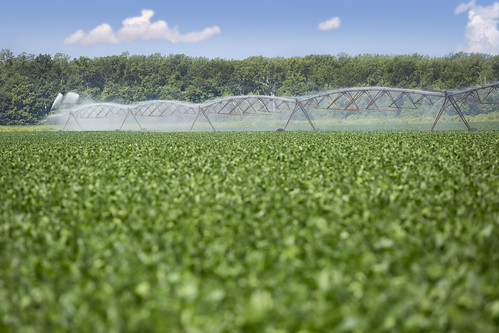Soybean Science Challenge launches gardening project
By Meleah Perez
U of A System Division of Agriculture
Aug. 7, 2017
Fast Facts:
- Twenty-five community and school gardens growing proteins this summer
- Goal is to connect more Arkansans to agriculture & promote healthy eating
- ARNaSoy seeds were developed in Arkansas
(641 words)
(Download this story in MS Word here.)
LITTLE ROCK — The Soybean Science Challenge, a program that encourages Arkansas high school students to study innovative and scientific aspects of the state’s No. 1 crop, has launched Grow Your Own Protein, a program designed to help school and community gardens benefit their respective constituents through a closer connection with agriculture.
The project aims to grow soybeans — a crop with several health benefits, said Karen Ballard, professor of Program Evaluation with the University of Arkansas System Division of Agriculture. Ballard is also the principal investigator for the Soybean Science Challenge.
The Soybean Science Challenge targets high school science teachers and students and provides online education and research about soybeans, Ballard said.
Ballard worked with the Natural Soybean and Grain Alliance (NSGA) to gain access to the Arkansas-produced soybean, ARNaSoy 5.6, a licensed variety handled by the NSGA. ARNaSoy seed packets went to the project’s garden partners and Cooperative Extension Service agents who volunteered to initiate the project in their respective counties. The seeds are non-genetically modified, Ballard said.
Soybeans are a complete protein, with all of the essential amino acids, meaning they have as much protein as animal products such as eggs, meats, poultry and seafood, according to the U.S. Food and Drug Administration (FDA). The FDA recommends adults ingest 50 grams of protein per day.
The Soybean Science Challenge helps raise awareness about the state’s No. 1 agricultural crop, said Gary Sitzer, the chairman of the Arkansas Soybean Promotion Board.
“Arkansas is a fairly small and rural state, but it still has a lot of population that has very little knowledge of the agriculture that they may drive by every day,” Sitzer said.
Sitzer said the hope is to reach as many people as possible, including community residents and students, by increasing knowledge and giving people a connection to agriculture.
“Soybeans are one of the major crops in the state, both in acres and in dollars. It’s a major driver in the agricultural economy in Arkansas,” Sitzer said.
The project is a chance for people to connect locally with the crop that has more acres than any other crop in Arkansas, Ballard said.
“It’s amazing to me how people have stepped up and wanted to participate and wanted to contribute,” Ballard said.
The Grow Your Own Protein project is at 24 community and school garden sites across Arkansas, from Washington County to Chicot County, and one garden in Texas.
Officials at the U.S. Department of Agriculture (USDA) from Texas heard about the project and requested seed packets to include in the USDA People’s Garden in College Station, Texas, Ballard said.
Leigh Ann Bullington, the Woodruff County Cooperative Extension Service staff chair, volunteered to grow soybeans in her county.
“We’re using the Soybean Science Challenge with community and school gardens so kids can see it (their hard work),” Bullington said. “Kids love planting them. They think it’s the greatest thing.”
Bullington said she wanted to be a part of the Grow Your Own Protein project because of her farming background, with an interest in soybeans, that stemmed from her family farm.
Most of the harvested soybeans go to food pantries while some gardens are partnering with senior centers. Soybeans from gardens located on school grounds will go directly toward school lunches in the fall, Ballard said.
Besides the Arkansas Natural Soybean and Grain Alliance, the project also partnered with the Soybean Promotion Board, county extension agents and the Centers for Disease Control and Prevention Obesity Reduction Grant faculty, Ballard said.
Ballard said she began the Grow Your Own Protein project this past spring. The Soybean Science Challenge has been working with Arkansas High Schools for five years.
“This is not something I’m doing that’s based on my job,” Ballard said. “It’s something I’m doing based on my history of growing up in rural Arkansas and making it part of my life.”
About the Division of Agriculture
The University of Arkansas System Division of Agriculture’s mission is to strengthen agriculture, communities, and families by connecting trusted research to the adoption of best practices. Through the Agricultural Experiment Station and the Cooperative Extension Service, the Division of Agriculture conducts research and extension work within the nation’s historic land grant education system.
Pursuant to 7 CFR § 15.3, the University of Arkansas System Division of Agriculture offers all its Extension and Research programs and services (including employment) without regard to race, color, sex, national origin, religion, age, disability, marital or veteran status, genetic information, sexual preference, pregnancy or any other legally protected status, and is an equal opportunity institution.
# # #
Media Contact: Mary Hightower
Dir. of Communication Services
U of A System Division of Agriculture
Cooperative Extension Service
(501) 671-2126
mhightower@uada.edu
Related Links
